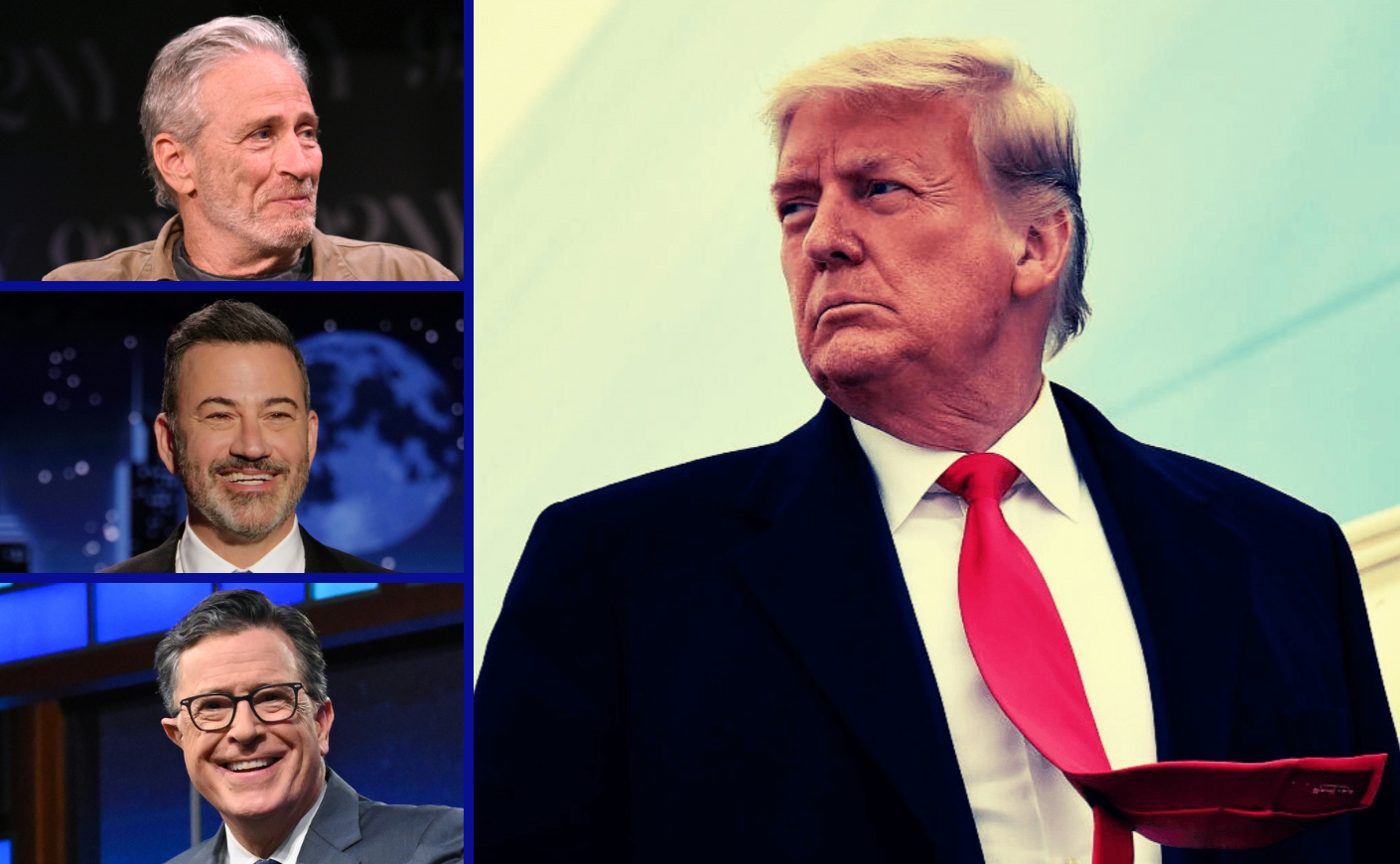When Donald Trump lost it late last week — sputtering fury at ABC News correspondent Mary Bruce, berating her for being “insubordinate,” disparaging her questions, and then threatening to have his FCC yes-man revoke ABC’s broadcast licenses — the connections were inescapable.
Connections to… late-night TV.
Trump had already tried the same bullying tactic with Jimmy Kimmel, even urging FCC chief Brendan Carr to go after the licenses of ABC-owned stations. Kimmel, on Tuesday night’s show, pointed out that Trump was now pulling the very same move on someone else at his own network.
But there’s an even bigger connection: The only non-political figures Trump targets as often — if not more often — than White House reporters are late-night TV hosts.
“No talent,” “ratings disaster,” “should be fired” late-night TV hosts, that is. And that was only the latest spew from Trump, dished up last weekend against Seth Meyers of NBC’s Late Night.
How have people from two professions — reporter and comedian — wound up playing the role of the meddlesome priest to a wannabe King Henry II? (See the film Becket.)
The link might be worthy of the Ken Burns treatment: challenging authority, which is how this whole American thing started.
Two-shot photo: Thomas Jefferson and Johnny Carson. At first it was great thinkers and idealists. Now it’s people with microphones and monologues.
Increasingly, the job of examining exactly what the Trump Administration is doing — and holding that group to some form of accountability — is falling to news people and comedy people. Congress isn’t doing it; neither are corporate interests.
Trump clearly doesn’t like anybody doing it. Unlike any previous president (a phrase that could begin almost any topic involving Trump), this one doesn’t believe in the give-and-take of either questioning or comedy.
His instinct, which he has laid out in various interviews and in the books that bear his name, is to always “hit back harder.”
For years, that strategy has paid off — big law firms and universities have shelled out simply to get out of his blast radius — and he has largely dodged any serious blowback for his rudeness, crudeness, and unprofessional treatment of others. But lately, more than at any point before, that bullying and bluster have started to boomerang.
Before yesterday, ABC’s Mary Bruce was a little-known journalist. So was Catherine Lucey, the White House correspondent for Bloomberg News, whom Trump waved a finger at and commanded: “Quiet. Quiet, piggy.”
The clips of both incidents went viral. The latter inspired widespread blowback, including from CNN anchor Jake Tapper, who described Trump’s behavior as “disgusting and completely unacceptable.”
The fact that Trump’s latest turn to misogynist insults to dodge legitimate questions from women reporters came on the same day he was compelled to acknowledge total defeat in his effort to bury information about the country’s most infamous pedophile (and onetime close Trump pal) only heightened the distaste for this familiar Trump tactic.
But of course, it also provided more fodder for comic commentary after 11 p.m. — nothing unusual for this man.
Maybe Nixon is still a contender; maybe O.J. Simpson had an equally intense run, if far more abbreviated. But almost certainly no previous public figure has provided a more sustained, gluttonously exhaustive font of comedic material than Donald J. Trump.
Is it good for late-night TV? That’s a question batted around endlessly since 2015 by both viewers and television executives. The “just too much” issue is both legitimate and irrelevant at the same time.
Of course many people are overwhelmed by the oppressive presence of Trump adulation/Trump detestation in every corner of American life. But that’s also why there has never been a more compelling reason for late-night comedy to play its role in that challenge-authority tradition.
It’s a version of the Mount Everest explanation: Because he’s there.
What has happened in recent weeks — especially as the Epstein story has gathered momentum and finally buried all the excuses and impediments thrown up by Trump and his governing cabal — is that the core group of late-night hosts — Stewart, Kimmel, Colbert, Meyers, and including Oliver and Maher —seem to be sensing more open target areas of vulnerability on Trump’s up-till-now armor-plated hide.
Stewart on Monday: “Is it possible that Trump’s whole bullshit façade is crumbling? Right now all he can do to distract from one lie is clearly another lie.”
Colbert: “Trump is beginning to freak out.”
Kimmel: “The shutdown may be over, but the meltdown is just beginning.”
Kimmel also played a clip of Trump booming some of his music playlist so loud it was deafening even outside the White House. “Nothing to see there, just the President of the United States alone in the White House, blasting ‘Phantom of the Opera’ full volume while rage-tweeting about how everybody’s out to get him.”
Between the comments about episodes like that and the reaction to the swinish slurs tossed at women journalists, the theme that Trump’s already filament-thin skin is turning brown from rot (an analogy he seems to like in a different context) is only likely to keep being ratcheted up — especially in the concentrated fire coming from multiple directions, late at night.
This story originally appeared on LateNighter. Get more pieces like this in your inbox: Sign up for LateNighter’s free daily newsletter.









